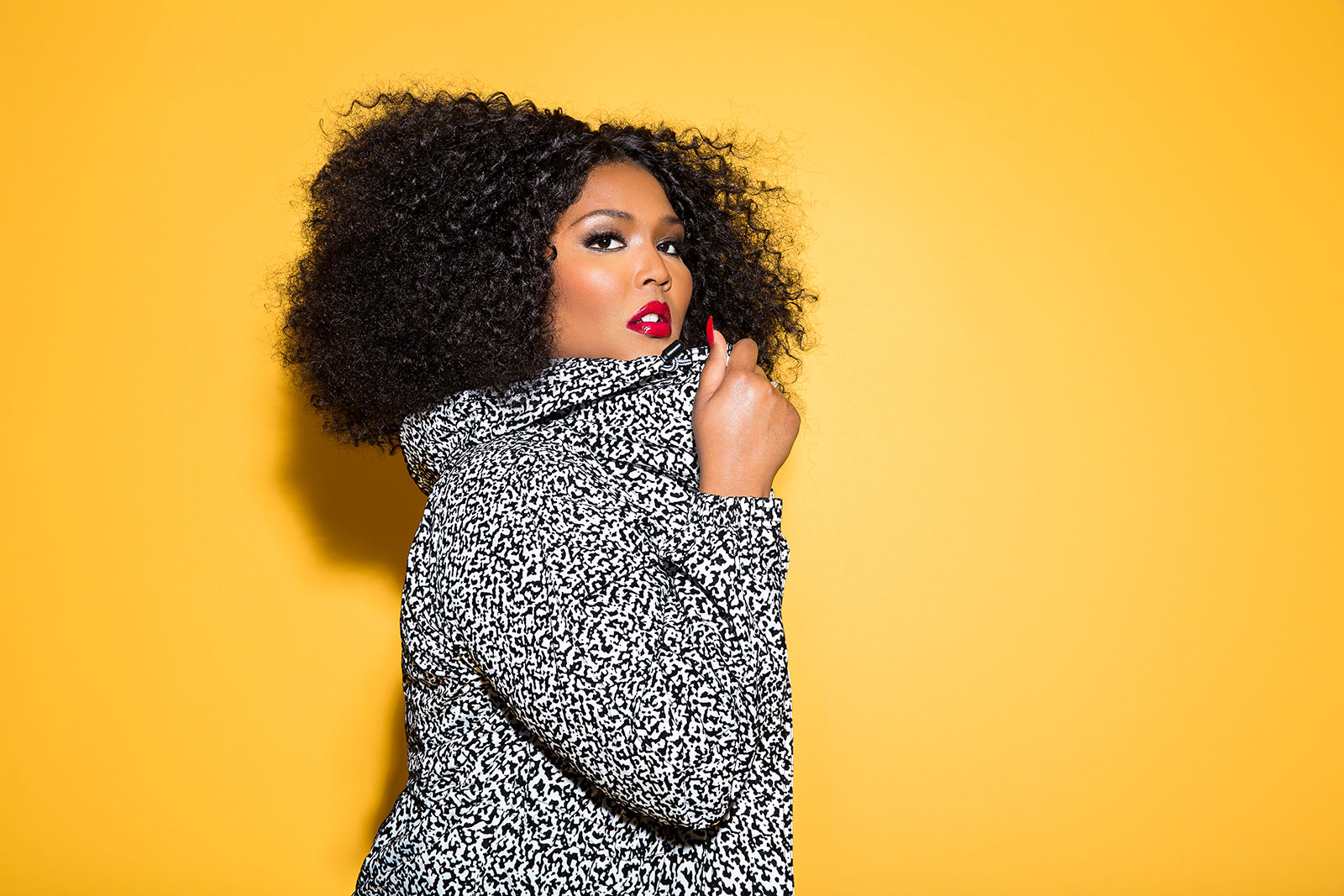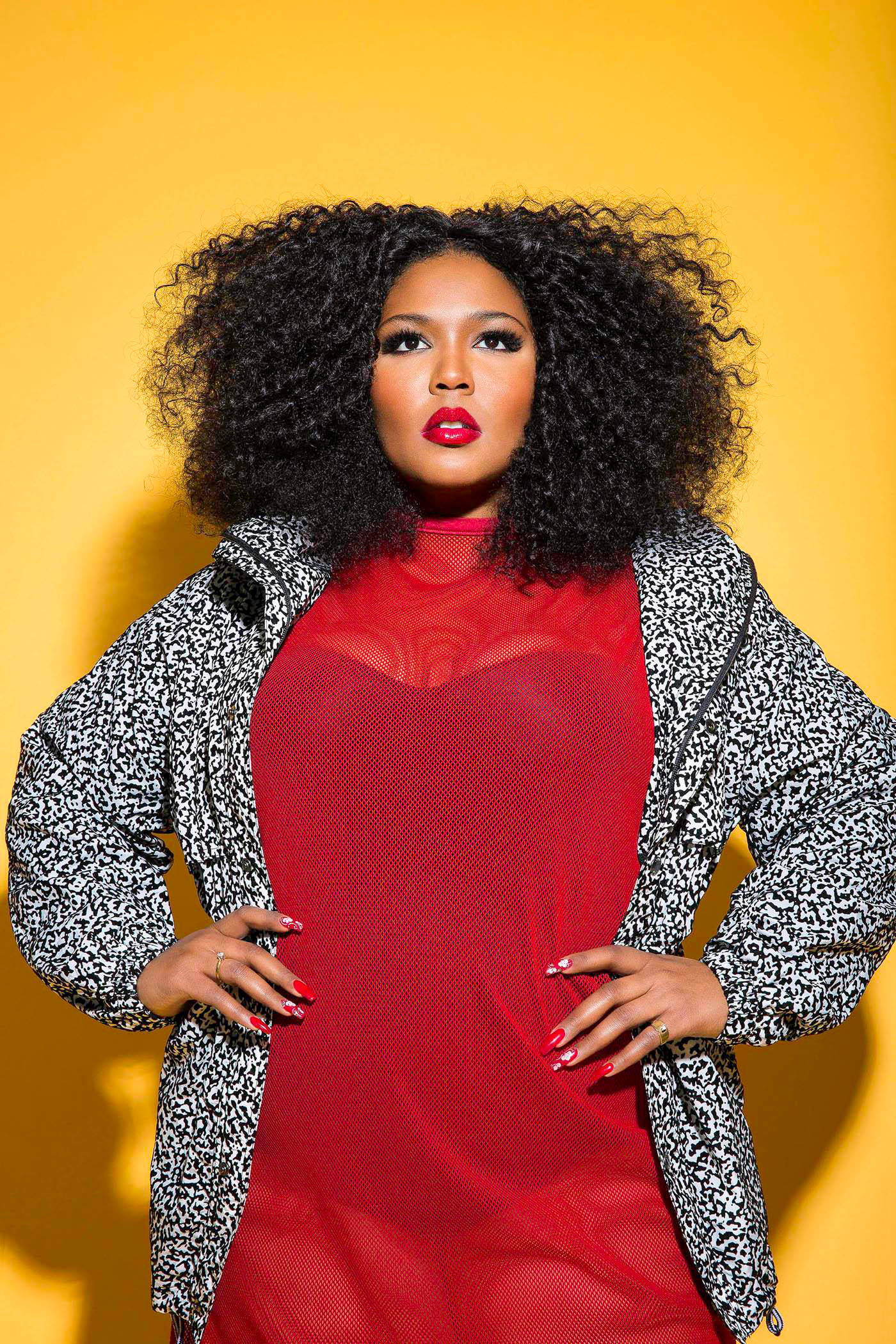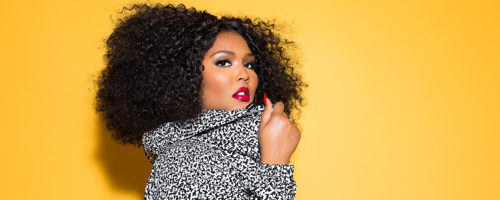There are four rules hip-hop artist Lizzo stands by: 1) Yes, eat that; 2) No, do not text back the f*ck boy; 3) Hush, her sex life is none of our business and 4) Coconut oil. The latter just happens to be the title of her EP released last October. “This is for my grrrls and boys,” she states on Twitter referring to her motivation behind the project. As a Black, plus-sized feminist, the bubbly 28-year-old Minneapolis native is finding common ground for women and men from a range of different life experiences through her music. Her confidence and consciously positive lyrics on Black empowerment, feminism, body image and self-love, make it that much harder to believe that she once couldn’t name a part of her body that she loved. When Lizzo throws down on the mic it’s spiritual. There is no filter, just a flow of raw connectivity driven by pure heart. She compares the experience to the spoken tongues she grew up witnessing by people in her Pentecostal church. Of freestyle rap, she says passionately, “I really think that it’s all kind of divine and comes from the same place.”
With an increasing fan base and many projects in the works, her rising success is cause for celebration. In between her funny quips that I can’t help but laugh to, she picks up her glass of rosé (she calls it ‘Champagne Papi’) and takes a sip, an emblematic toast to the Toronto stop of her Coconut Oil tour. She is happy, and she’s not letting anybody come in the way of that.
On your EP, Coconut Oil, you wrote a song of the same name as an ode to Black sisterhood and to celebrate your Blackness. What has the reception been like for your EP by all your fans, especially women of colour?
Really well-received. I have a really feminist fan base and I have a lot of white people in my fan base … I’m always touring with these indie bands, with really, you know, indie or white crowds. And we toured with SZA and her audience was women of colour. I remember being like, ‘Oh my goodness I get to sing to my people.’ The way that I’m received is just so different … I do feel a responsibility as a woman of colour to make music that represents them. I also feel a responsibility to do other things. I’m a feminist. I’m a fat person. So, I need to be representing those people too, you know. But specifically, for my girls and my natural girls, I’m out here doing this for them because we don’t get heard from or seen very often.
Why Coconut Oil, though? Why that name?
Lizzobangers was all about self-exploration. That was my first project. It was like all this anger and all of this venting and all of these questions and I’m like trying to find myself. And then Big GRRRL Small World was all about self-love which I have a song called, “En Love” and “My Skin,” and there’s all these songs on there where I’m learning how to love this person that I’ve discovered, and then I realized that this album was a little package or an ode to self-care and I was like, ‘What better way to represent self-care than coconut oil?’ which is a part of my daily routine. Every time I shower, I make sure I coconut oil up, deep condition hair with coconut oil. There’s just all these uses and it’s all these techniques for self-care and that’s really been where I’ve been focusing on this last year. So, I just named it that. Kept it cute.

Once you realize what your frame is and you f*ck with it super hard you can dress it, you feel confident in it and it’s your outfit before you put your outfit on.
You spoke in an interview about the inspiration behind your song, “My Skin,” how you came to the realization that your skin was your favourite body part and to celebrate your Blackness. What new affirmations have you adopted about yourself since then?
This year has been really interesting because through self-care I’ve also been feeling better about myself, like physically, and I’m discovering little things. I took my first ass pic. I was on my phone and I was like, ‘That’s what my ass looks like? (laughs)’ I’m appreciating body parts. I have a very muscular frame. Even though it’s big, I’m strong and muscular and I like that about myself. I like my slender wrists and my elbows. I like my frame as a plus-sized woman, and I think that that’s been really exciting to discover. Everyone has a bit of dysmorphia, but once you realize what your frame is and you f*ck with it super hard you can dress it, you feel confident in it and it’s your outfit before you put your outfit on. But it takes time, and you got to find out one thing you really like about yourself and then it just opens up the gates to all of these wonderful things. I’m still learning though.
Your personal journey to self-love hasn’t been an easy one, but now you have young girls looking up to you as a source of inspiration because of your courage to embrace who you are as a Black full-figured woman, so how does it feel to be making a difference in the lives of these girls and young women?
Yo, it feels good … Once I was at peace with the idea of making just positive music and Coconut Oil came out, it feels like a weight off of my chest. Now I can just be like, ‘I’m happy and you should be f*cking happy, and let’s all be happy.’ And girls are like, ‘Yes, thank you so much. This song helped me …’ I got a DM from somebody who said, ‘“Good as Hell” helped me get out of a relationship and quit a job where I wasn’t appreciated and I just want to thank you for that.’ And there’s people who have been hitting me up who’ve been using my music, not just for therapy, but for activism in their lives and making their lives actively better. And, it’s a big deal because I’ve decided that’s why I do it, you know. And, it’s not just for fat Black girls. It’s for everybody. You will be surprised at how many white girls — like thin white girls — are just like, ‘Thank you.’ People who don’t look like me. Men saying thank you. Gay men are like thank you. I’m making this music and all these people are connecting with it from all different walks of life and I don’t know man, it feels really good.
How much are you thinking that you have a personal responsibility to be a role model?
I don’t think that it’s anyone’s job to be a role model. I think you just are. If you assign yourself that job, that’s really big of you. I don’t think anyone is obligated to be a role model. I just think it’s something that’s happening with me. Because of that, I do mind my language and my steps as in I never want to offend or alienate anybody when I speak and I always want to be very inclusive because I feel like a lot of the policies that I speak of like feminism can be exclusive sometimes being a Black woman. Afrocentricity can be exclusive sometimes and I never ever want to be that person that made anyone feel left out from any type of struggle or point of view. So, I do think about that because I know that I am somebody’s role model, but I am not pressed to be like, ‘Oh, my job description — rapper, singer, flute player, role model.’ It’s not in my job description.

We have the f*cking universe between our thighs and somehow everything on our body is regulated and I think that that’s the problem.
Let’s switch gears now. For your last two albums, Lizzobangers and Big Grrrl Small World, you subscribed to the writing style of pen to paper, but with Coconut Oil, you’re kind of channeling those lyrics inside the booth as it comes. How has this freestyle method changed you as an artist?
It’s changed me in the way that I trust myself a little bit more. I always knew that I could be like technically impressive — I could rap fast or I could write a lyric that makes you think and uses all these references, but when you’re just pulling your inspiration from thin air or from God’s lips or however you want to describe it, it’s just like this innate type of meaningful beauty or harmony with the universe somehow. It’s getting very, very heady right now, but something harmonizes with the universe when you do it that way. And because of that, it creates this universal language that everyone understands. Freestyling says the things that’s in everyone’s head.
We’ve all been devastated by the loss of Prince [last] year. You had the pleasure of collaborating with him. Tell me about that experience and how his music and legacy has impacted your work.
I can’t even believe that that happened. Like, I can’t believe that I’m on his record. I can’t believe that I recorded at Paisley Park on his microphone. I can’t believe that I got to see him, play piano and sing for an hour and a half. I can’t believe these things. I can’t believe I got to perform at Paisley Park and that he’s a fan of my music. It’s very surreal and if I don’t feel responsible to be a role model and if I don’t feel responsible to adhere to anyone’s rules, I feel a responsibility to uphold the legacy, and I’m sure thousands of other artists do as well, as they should. But something kind of evaporated — I don’t know if it was evaporated or exploded into the world into the thin layer of energy that circles the planet — when he passed away, but everybody felt it. Every creative person felt it, and you just feel an obligation to keep that legacy going. He supported women, women of colour and he supported creative artists. I remember being so nervous because I was like, ‘What if he wants us to sing something he already wrote?’ You never know how it goes, but he was like, ‘Treat this as if it was your song,’ and I remember I treated it as if it was my own song and he left everything in. To me that showed that he respected me as an artist and I literally felt like I went from being a rapper and a musician and became an artist after that day. I’m solely doing positive music from now on. I don’t think there’s enough people spreading enough positive music, and I’m going to be one of those people, you know. And I can 100 per cent — because of Prince — say that’s why I’m doing it.
In the recent U.S. election, Hilary Clinton was a big advocate for women’s rights, even represented the women’s vote. She won the popular vote by a landslide, by a lot, but it still wasn’t enough to win the presidency. Some may have argued that it was because of the email scandal that she was involved in. Others may have argued that the U.S. just wasn’t ready for a female president. What do you think?
It’s just so ridiculous to even say that we aren’t ready for a female president. Every person who is born in America was born from a woman. A woman has led your life for most of your life, or at least created you. Why does that not crossover into anything else? Why does that not crossover into the American culture or the infrastructure? We’re the givers of life. We have the f*cking universe between our thighs and somehow everything on our body is regulated and I think that that’s the problem. I don’t think it’s being ready for a female president. I think it’s the whole American government. I don’t think we’re ready for true democracy or true freedom; we’re not ready to hear anyone speak truly for our rights. We’re all living with this really pretty veil and this really cushy comfort zone and I think that Hilary wouldn’t have changed anything about that. I think Bernie maybe would have, but I think Trump, actually, is going to compromise that comfort zone. Trump will definitely not inspire, but create some chaos and some discomfort, and I think that that’s something that the American public or the general population has been needing for some time.
What do you have to say about Donald Trump’s derogatory comments regarding young girls and women during his presidential campaign?
Unfortunately, he’s not the only person who talks like that. He reflects a large population of wealthy men who still are rooted in misogyny and xenophobia and racism that words don’t really mean much to them. It’s money. Money talks; power and influence talk. All I can say is that he got away with it and unfortunately all they’ve ever done was gotten away with it. And [if] anybody else, a woman, a person of colour, a poor person tried that, no, it would not fly. He exists in an elite group of people that can get away with literally murder. That’s it. It sucks. God only knows what those other presidents have said in the past back in the day before social media. They’ve been getting away with shit forever so I’m not shocked. We just have the Internet, and if we can watch a Black man get murdered by a white man on camera and they’re still like, ‘It wasn’t murder,’, in the court of motherf*cking law, then Donald Trump can say he [would date] his daughter all day and still be the president.
Photos by. Jabari Jacobs courtesy of Warner Music Canada




1 Comment
Great article!